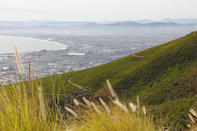Food Production at the Cape
In 1657, five years after the Dutch landed in the Cape, the first free-hold farms were granted to private farmers in an attempt to stimulate food production at the Cape.

Initially, only 9 ‘free burghers’ - free citizens - took up the Company’s offer, and moved into their new lands along the Liesbeek River. The first title deeds were granted around a clump of thorn trees called ‘Het Ronde doornbosjen’ – now simply called Rondebosch – but, over the years, the Free Burghers spread along the river and beyond. By the time Van Riebeeck left the Cape for his new post in Batavia, the official population stood at 134 Company officials, 35 Free Burghers, 15 women, 22 children and 180 slaves.
Good and Faithful Subjects
It was a tough existence outside the aegis of the Castle in the Cape. Khoikhoi raiders were a constant threat, there was no infrastructure, and knowledge of local farming conditions was severely limited. Yet, despite this inauspicious start, the flood gates had been irrevocably opened.
The occupation of South Africa had begun. Even though this new class of aspirant entrepreneurs had completed their contracts with the Company and were technically ‘free’, the Free Burghers were still bound to obey the Company’s rules and had to remain ‘good and faithful’ subjects of their de facto political authority. In return for their good behaviour, however, the Free Burghers’ farms were ‘granted in freehold’ with ‘as much land as he may desire for gardens’.
A Strict Monopoly
Firstly, the whole system was cheap to set up, since the fertile farm land along the river was settled without any permission from, or payment to, the local tribes. Secondly, the Dutch East India Company hedged its bets by maintaining a strict monopoly on the market for any goods produced by their Free Burghers.
This meant that Free Burghers were only allowed to sell their produce directly to the Dutch East India Company, or VOC - Vereenigde Landsche Ge-Oktroyeerde Oostindische Compagnie - at whatever price they felt were appropriate. The VOC then made on a big mark-up and sold the goods to ships calling at the harbour.
This may sound like standard business practice today, but remember that the cunning VOC could dictate the prices on both sides of the deal; paying a pittance for the farmer’s harvest and ripping off the needy ships at anchor. Still, we shouldn’t be surprised. This profit-at-all-cost attitude is actually specified in most corporate charters, and any well-run monopoly will eventually result in price gouging.
Tavern of the Seas
The Free Burghers soon became similarly disillusioned with the system, as it quickly became apparent that no-one was going to get rich growing food for the Company. The Dutch East India Company kept produce prices very low and, furthermore, instituted a covert system of kickbacks that made favoured farmers rich and left the poor ones with nothing.
Many of these early farmers eventually gave up on their fields and drifted back into the towns, where they opened bars and eating places for the visiting sailors. This earned Cape Town the title ‘Tavern of the Seas’. Those farmers who didn’t go into bartending often had to bend the law to make ends meet. Some started trading illegally with ships which snuck into False Bay. Others undertook surreptitious ‘hunting’ expeditions to supplement their income.
By David Fleminger